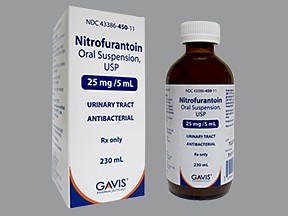
nitrofurantoin suspension – oral, Furadantin
Medication Uses How To Use Side Effects Precautions Drug Interactions Overdose Notes Missed Dose Storage USES: Nitrofurantoin is an antibiotic used to treat or prevent bladder infections. It stops bacteria from growing. This antibiotic only treats bacterial infections. It does not work for viral infections (e.g., common cold, flu). Using antibiotics unnecessarily or too much can make them less effective. This medication should not be used in infants younger than 1 month old (see Precautions section). It should not be used to treat infections outside the bladder (e.g., kidney infections). HOW TO USE: Shake the bottle well before each dose. Take this medication with food as directed by your doctor. It is usually taken 4 times daily to treat an infection or once daily at bedtime to prevent infections. The dosage and length of treatment are based on your medical condition and response to therapy. For children, the dosage is also based on body weight. This drug may be mixed into water, juice, milk, or formula to improve the taste. Rinse the mouth after each dose to prevent temporary staining of the teeth. Do not use antacids containing magnesium trisilicate while taking this medication. These antacids can bind with nitrofurantoin and prevent its full absorption. Antibiotics work best when the amount of medicine in your body is kept constant. Therefore, take this drug at evenly spaced intervals. When taking this medication to prevent infection, take it exactly as directed by your doctor. Do not skip doses or stop taking it without your doctor’s approval. Inform your doctor if you notice signs of a bladder infection (e.g., pain while urinating). If you are taking this medication to treat an infection, continue to take it until the full prescribed amount is finished, even if symptoms disappear after a few days. Stopping the medication too early may allow bacteria to grow, which may result in a return of the infection. Inform your doctor if your condition persists or worsens. SIDE EFFECTS: Nausea, vomiting, loss of appetite, or headache may occur. Take this medication with food to help minimize nausea. If any of these effects persist or worsen, notify your doctor or pharmacist promptly. Remember that your doctor has prescribed this medication because they have judged that the benefit to you is greater than the risk of side effects. Many people using this medication do not have serious side effects. This medication may cause your urine to turn dark yellow or brown. This is usually temporary and harmless, but it can also be a sign of liver problems or anemia. Seek immediate medical attention if you notice dark urine along with persistent nausea/vomiting, abdominal/stomach pain, yellowing eyes/skin, tiredness, or fast/pounding heartbeat. Tell your doctor immediately if you experience eye pain, vision changes, mental/mood changes, persistent/severe headaches, new signs of infection, easy bruising/bleeding, numbness/tingling of the hands/feet, unusual muscle weakness, or symptoms of lung problems. This medication may rarely cause a severe intestinal condition (Clostridium difficile-associated diarrhea). Do not use anti-diarrhea products or narcotic pain medications if you have persistent diarrhea or abdominal/stomach pain. Tell your doctor immediately if you develop these symptoms. Prolonged or repeated use of nitrofurantoin may result in oral thrush or a new vaginal yeast infection. Contact your doctor if you notice white patches in your mouth, a change in vaginal discharge, or other new symptoms. A serious allergic reaction to this drug is unlikely, but seek immediate medical attention if it occurs. Symptoms may include rash, itching/swelling, severe dizziness, or trouble breathing. This is not a complete list of possible side effects. If you notice other effects not listed above, contact your doctor or pharmacist.
PRECAUTIONS: Before taking nitrofurantoin, tell your doctor or pharmacist if you are allergic to it or if you have any other allergies. This product may contain inactive ingredients that can cause allergic reactions or other problems. Talk to your pharmacist for more details. This medication should not be used if you have certain medical conditions. Before using this medicine, consult your doctor or pharmacist if you have: kidney disease, a certain genetic condition, or a history of liver problems due to nitrofurantoin use. Before using this medication, tell your doctor or pharmacist your medical history, especially of: liver disease, lung disease, numbness/tingling of the arms/legs, vitamin B deficiency, mineral imbalance, blood disorders, diabetes, persistent weakness, or certain eye disorders. Kidney function declines as you grow older. This medication is removed by the kidneys, so older adults may be at greater risk for side effects. During pregnancy, this medication should be used only when clearly needed and not if you are near the end of your pregnancy or at the time of labor and delivery. It can cause a certain blood disorder in your baby. Consult your doctor before breastfeeding. DRUG INTERACTIONS: Your healthcare professionals may already be aware of any possible drug interactions and may be monitoring you for it. Before using this medication, tell your doctor or pharmacist about all prescription and nonprescription/herbal products you may use, especially certain drugs to treat gout. Some antibiotics may decrease the effectiveness of hormonal birth control. Ask your doctor or pharmacist if you should use additional reliable birth control methods while using this antibiotic. This medication may interfere with certain laboratory tests. Make sure laboratory personnel and all your doctors know you use this drug. This is not a complete list of possible drug interactions. Keep a list of all your medications and share it with your doctor and pharmacist.
QUESTION
OVERDOSE: If overdose is suspected, contact a poison control center or emergency room immediately. US residents can call their local poison control center. NOTES: Do not share this medication with others. This medication has been prescribed for your current condition only. Do not use it later for another infection unless instructed to do so. Laboratory and/or medical tests should be performed periodically to monitor your progress or check for side effects. Lung function tests should be performed if you are prescribed nitrofurantoin products for extended treatment. MISSED DOSE: If you miss a dose, take it as soon as you remember. If it is near the time of the next dose, skip the missed dose and resume your usual dosing schedule. Do not double the dose. STORAGE: Store at room temperature. Protect from light and freezing. Discard any unused medication 30 days after opening the bottle. Keep all medications away from children and pets. Do not flush medications down the toilet or pour them into a drain. Properly discard this product when it is expired or no longer needed. Consult your pharmacist or waste disposal company for more details. Information last revised November 2013. Copyright(c) 2013 First Databank, Inc.
Report Problems to the Food and Drug Administration
You are encouraged to report negative side effects of prescription drugs to the FDA. Visit the FDA MedWatch website or call 1-800-FDA-1088.
Selected from data included with permission and copyrighted by First Databank, Inc. This copyrighted material has been downloaded from a licensed data provider and is not for distribution, except as may be authorized by the applicable terms of use.
CONDITIONS OF USE: The information in this database is intended to supplement the expertise and judgment of healthcare professionals. The information is not intended to cover all possible uses, directions, precautions, drug interactions, adverse effects, or indicate that use of a particular drug is safe, appropriate, or effective for you or anyone else. A healthcare professional should be consulted before taking any drug, changing any diet, or commencing or discontinuing any course of treatment.


